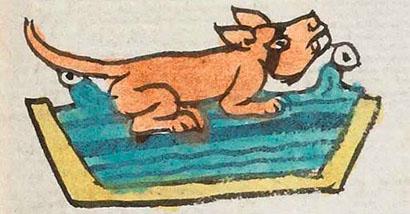Cozamaloapan (Mdz46r)
This compound glyph for the place name Cozamaloapan ("On the Rainbow") consists of two main elements. One is an animal that is apparently a weasel (cozatli), also called a cozama in the Florentine Codex (Book 11, f. 14r). It might also be a lynx (cozantli). The four-legged animal is shown in profile facing to our right. It is terracotta in color with the exception of a black band across its eyes. The other main element in this compound glyph is the cross-section of a trapezoid-shaped canal (apantli) with water. The outer support for the canal is a yellow construction. The water is the typical turquoise blue color with black bands of different thickness (with one especially thick line across the middle) to show currents or waves, plus a suggestion of white droplets/beads and turbinate shells splashing off the top.
Stephanie Wood
Given the propensity for the letter “n” to drop or be intrusive, it is difficult to say whether this animal is a cozatli or a cozantli. Furthermore, the dictionaries are vague as to how to translate either word. However, the animal in this compound glyph has a black mask across his eyes. Images of weasels and ferrets show that both of these small animals can have a dark marking across the eyes and over the nose. This is not true of the lynx or snow leopard. Weasels do still exist in Mexico, but ferrets have died out. So, in the end, weasel is likely the answer.
In line with Clark (1938 2, 49; cited by Berdan and Anawalt), Frances Karttunen suggests that the animal has no semantic value in this place name. Rather, it is there to provide a phonetic clue for the reading of rainbow (acozamalotl or cozamalotl).
Stephanie Wood
coçamaloapā, puo
Cozamaloapan, pueblo
Stephanie Wood
c. 1541, but by 1553 at the latest
Stephanie Wood
rainbows, comadrejas, linces, arcoirises, nombres de lugares

coza(tli), a weasel, https://nahuatl.wired-humanities.org/content/cozatli
cozan(tli), a lynx, https://nahuatl.wired-humanities.org/content/cozantli
cozamalo(tl), rainbow, https://nahuatl.wired-humanities.org/content/cozamalotl
acozamalo(tl), rainbow, https://nahuatl.wired-humanities.org/content/acozamalotl
apan(tli), waterway or canal, https://nahuatl.wired-humanities.org/content/apantli
-apan (locative suffix) on or at the waters, https://nahuatl.wired-humanities.org/content/apan0
a(tl), water, https://nahuatl.wired-humanities.org/content/atl
"At Rainbow Lake" or "At Rainbow Canal." [From an unpublished manuscript, "Critique of Glyph Catalogue in Berdan and Anawalt Edition of Codex Mendoza."]
"On the Water of the Captive Weasels" (Berdan and Anawalt, 1992, vol. 1, p. 180)
"Junto al Lago del Arcoíris" o "Junto al Canal del Arcoíris"
Stephanie Wood
Codex Mendoza, folio 46 recto, https://digital.bodleian.ox.ac.uk/objects/2fea788e-2aa2-4f08-b6d9-648c00..., image 102 of 188.
The Bodleian Libraries, University of Oxford, hold the original manuscript, the MS. Arch. Selden. A. 1. This image is published here under the UK Creative Commons, “Attribution-NonCommercial-ShareAlike 3.0 License” (CC-BY-NC-SA 3.0).

